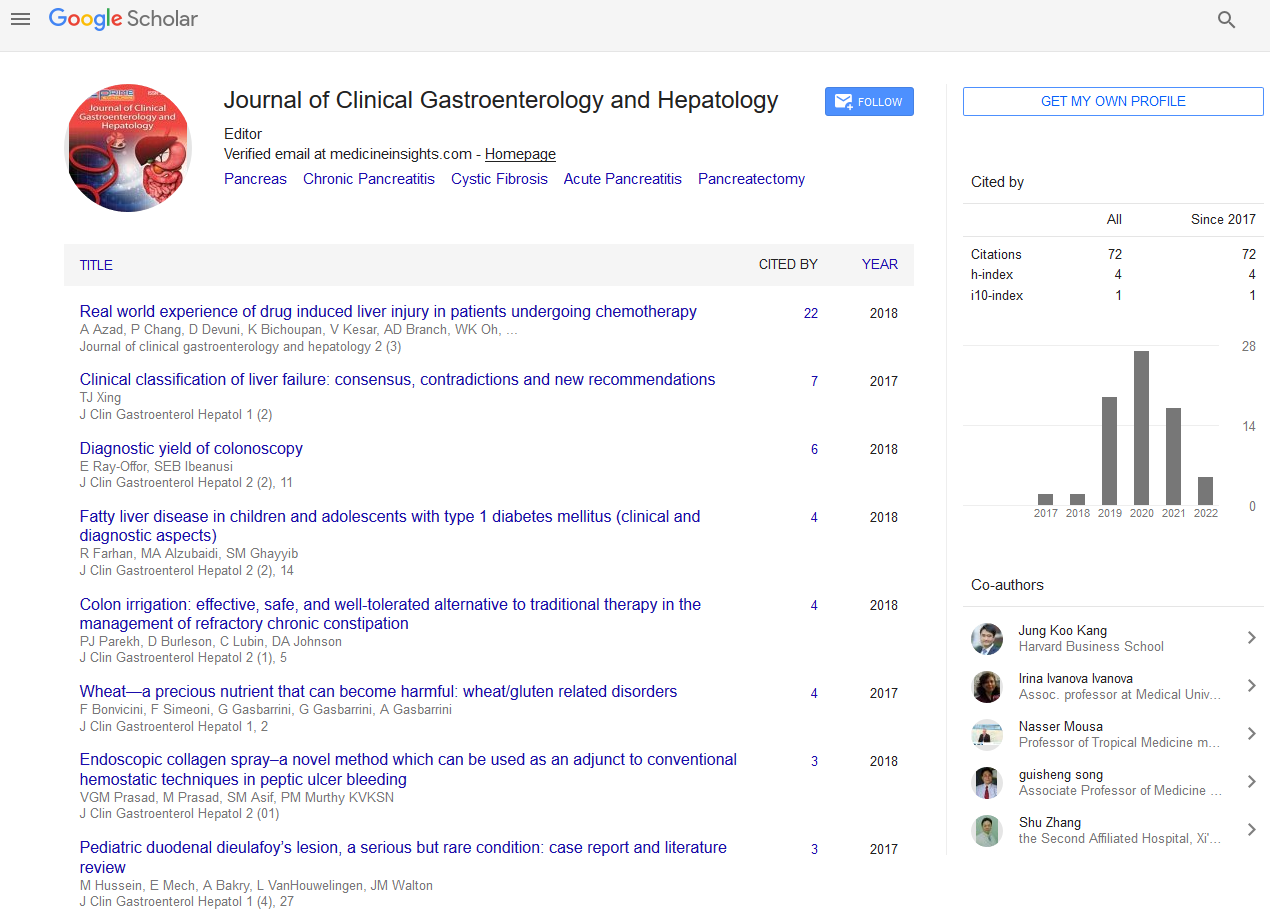Perspective - (2023) Volume 7, Issue 2
Unpredictable Fluctuations in Blood Glucose Levels, Gastroparesis does not cause Diabetes
Maurizio Gallieni*
Department of Human Nutrition, University of Otago, New Zealand
*Correspondence:
Maurizio Gallieni,
Department of Human Nutrition, University of Otago,
New Zealand,
Email:
Received: 29-Mar-2023, Manuscript No. IPJCGH-23-16557;
Editor assigned: 31-Mar-2023, Pre QC No. IPJCGH-23-16557 (PQ);
Reviewed: 14-Apr-2023, QC No. IPJCGH-23-16557;
Revised: 19-Apr-2023, Manuscript No. IPJCGH-23-16557 (R);
Published:
26-Apr-2023, DOI: 10.36648/2575-7733.7.2.17
Introduction
Despite the fact that there is no blockage in the stomach or digestion tracts, gastroparesis, otherwise called postponed gastric discharging. In addition to feeling full shortly after starting a meal or for an extended period of time after eating, gastroparesis can also cause nausea and vomiting. Diabetes is the most common cause of gastroparesis. With gastroparesis, the stomach is paralyzed. This functional disorder affects nerves and muscles in your stomach. To process food and transport it to your digestion tracts, it debilitates and dials back stomach muscle withdrawals. Along these lines, food stays in your stomach for a really long time. The ordinary, controlled development of food through your stomach related framework is upset by gastroparesis. Likewise, this can possibly upset the consistent, controlled arrival of glucose into your circulation system. Your glucose might fall too low when food sits in your stomach for an exorbitant measure of time. When food is finally broken down, your blood sugar may rise.
Description
Gastric emptying scintigraphy, a type of nuclear medicine imagining test, measures the time it takes for a meal or beverage to travel through your digestive system. This is accomplished by scanning a small amount of radioactive food or drink on a regular basis. Gastroparesis can impede normal digestion and cause abdominal pain, nausea, and vomiting. It can also affect blood sugar levels and nutrition. Gastroparesis can be alleviated with diet and medication changes, but there is no cure. The vagus nerve, which controls the intricate processes in your digestive tract, tells your stomach’s muscles to contract and push food into the small intestine. A damaged vagus nerve prevents the muscles in your stomach from receiving normal signals. Food may stay in your stomach for longer if this prevents it from entering your small intestine to be digested. A strong mass known as a bezoar can form in your stomach from food that has not been digested. Bezoars may be harmful if they prevent food from entering your small intestine, which could lead to sickness and bleeding. In spite of the fact that gastroparesis doesn’t cause diabetes, flighty changes in glucose levels can result from continuous changes in the rate and measure of food passing into the little entrail. These fluctuations in blood sugar worsen diabetes. When blood sugar levels are not properly managed, gastroparesis gets worse. By causing the muscles in the stomach to contract, it can help alleviate nausea. However, it carries a black-label warning due to the possibility of side effects like tremors and muscle twitching. Doctors use your medical history, a physical exam, your symptoms, and medical tests like tests to see how quickly your stomach empty’s to diagnose gastroparesis.
Conclusion
Clinical trials might be utilized by your PCP to search for intricacies of gastroparesis. The food you eat can help you feel better if you have gastroparesis. What you eat can also help ensure that you get the right amount of nutrients, calories, and fluids if you are malnourished or dehydrated due to gastroparesis. The cause of gastroparesis is usually unknown. Sometimes it’s a complication of diabetes, and some people develop gastroparesis after surgery.
Citation: Gallieni M (2023) Unpredictable Fluctuations in Blood Glucose Levels, Gastroparesis does not cause Diabetes. J Clin Gastroenterol Hepatol. 7:17.
Copyright: ©2023; Gallieni M. This is an open-access article distributed under the terms of the Creative Commons Attribution License, which permits unrestricted use, distribution, and reproduction in any medium, provided the original author and source are credited.

